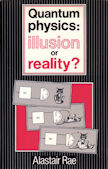The present book describes the basic ideas of quantum physics and discusses both the longstanding and the more modern conceptual problems. It then goes on to discuss the “measurement problem” which arises when quantum physics is taken to be the fundamental theory of physics, applicable to large-scale physical systems as well as to atomic phenomena. Various attempts to resolve the resulting contradictions have led some physicists to suggest that human consciousness plays a unique role in the physical world and others to postulate that the physical universe is continually splitting into a huge number of copies of itself. Other possible explanations seem to imply that quantum physics is not the final universal theory it is thought to be and that at least one more revolutionary change in our thinking about the fundamental nature of the physical world is required. Recent suggestions that quantum physics might be capable of explaining so-called paranormal phenomena are critically reviewed.
The author assumes only a very little knowledge of physics, and uses only a minimum of quite elementary mathematics. As a result, this book will appeal to anyone interested in the ideas of modern physics, as well as to students of physics and philosophy.
